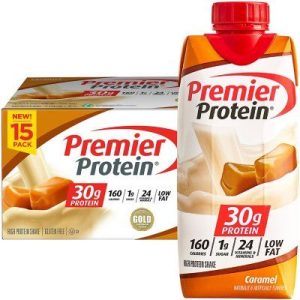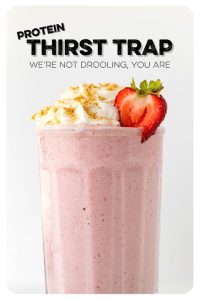
Protein powder is a popular supplement among athletes and fitness enthusiasts. It’s a concentrated source of protein, a nutrient essential for building and repairing muscle tissue. But is protein powder necessary for teens?
This article explores protein needs for teens, the potential benefits and drawbacks of protein powder, and alternative ways to get enough protein in your diet.
Teens are still growing and developing, so it’s important to talk to a doctor or registered dietitian before considering protein supplements.
How Much Protein Do Teens Need?
The amount of protein a teen needs depends on several factors, such as age, sex, and activity level. However, most teens can get enough protein from a balanced diet that includes lean protein sources like:
- Chicken
- Fish
- Beans
- Tofu
- Eggs
Here’s a general guideline for daily protein intake for teens:
- Ages 14-18 (females): 46 – 52 grams per day
- Ages 14-18 (males): 52 – 56 grams per day
If you’re unsure about your protein needs, a doctor or registered dietitian can help you determine the right amount for you.

Potential Benefits of Protein Powder for Teens
There can be some benefits to protein powder for teens, especially if they struggle to meet their protein needs through diet alone. Protein powder can:
- Help with muscle recovery after exercise
- Support muscle growth and development
- Increase feelings of fullness and satisfaction
However, it’s important to note that these benefits are most likely experienced by teens who are actively engaged in sports or strength training.
Drawbacks of Protein Powder for Teens
There are also some potential drawbacks to consider when it comes to protein powder for teens:
May not be necessary:
For most teens, a balanced diet can provide all the protein they need.
Can be high in calories and sugar:
Some protein powders are packed with added sugars and calories, which can contribute to weight gain.
May mask underlying health problems:
If you’re struggling to get enough protein from food, it could be a sign of an underlying health condition. A doctor can help identify the cause.
Potential for overuse:
Consuming too much protein can put strain on your kidneys.
It’s important to weigh the potential benefits and drawbacks before deciding if protein powder is right for you.

Getting Enough Protein from Food
There are many delicious and nutritious ways to get enough protein in your diet without protein powder. Here are some ideas:
- Lean meats and poultry: Chicken, turkey, fish, and lean cuts of beef are all excellent sources of protein.
- Eggs: Eggs are a complete protein source, meaning they contain all the essential amino acids your body needs.
- Beans and legumes: Beans, lentils, and chickpeas are affordable and versatile protein sources.
- Dairy products: Milk, yogurt, and cheese are good sources of protein and calcium.
- Nuts and nut butters: Almonds, peanuts, and other nuts are healthy snacks packed with protein and healthy fats.
By incorporating a variety of protein sources into your diet, you can easily meet your daily needs.
The Takeaway: Focus on a Balanced Diet
Protein powder can be a helpful supplement for some people, but it shouldn’t be a replacement for a balanced diet. For most teens, a diet rich in lean protein sources, fruits, vegetables, and whole grains is the best way to get the nutrients you need to grow and thrive.
If you’re unsure about whether you need protein powder, talk to a doctor or registered dietitian. They can help you create a personalized plan to meet your nutritional needs.
Building a Healthy Relationship with Food
Teens are at a crucial stage for developing healthy eating habits that will last a lifetime. Focusing on a balanced diet that incorporates a variety of nutrient-rich foods is essential for overall health and well-being.
Here are some tips for building a healthy relationship with food:
- Eat regular meals and snacks: Aim for three meals and two or three snacks throughout the day to keep your energy levels up and metabolism running smoothly.
- Focus on whole foods: Choose unprocessed or minimally processed foods whenever possible. These foods are generally packed with more nutrients and fiber than processed foods.
- Make half your plate fruits and vegetables: Fruits and vegetables are loaded with vitamins, minerals, and fiber, all essential for good health.
- Choose lean protein sources: Include lean protein sources like chicken, fish, beans, or tofu in your meals and snacks.
- Limit unhealthy fats: Processed foods, fried foods, and sugary drinks are often high in unhealthy fats. Limiting these foods will improve your overall health.
- Stay hydrated: Drinking plenty of water throughout the day is important for overall health and can also help you feel full.
By following these tips, you can develop a healthy relationship with food that will nourish your body and support your long-term health.

When to Talk to a Doctor or Registered Dietitian
If you have any concerns about your diet, protein intake, or overall health, it’s always best to talk to a doctor or registered dietitian. They can help you create a personalized plan to meet your individual needs.
Here are some specific instances where talking to a doctor or registered dietitian is recommended:
- You have a medical condition that affects your nutrient absorption.
- You’re unsure how much protein you need based on your activity level.
- You’re struggling to meet your protein needs through diet alone.
- You’re considering taking protein powder or other supplements.
A doctor or registered dietitian can provide guidance and support to help you reach your health and fitness goals.
Remember, you are not alone! Many resources are available to help you on your journey to a healthy lifestyle.

The teen years are a time of great change and exploration. Developing healthy habits now will set you on a path to lifelong well-being. Focus on feeling good and embrace activities that make you feel strong and energized. Remember, there is no one-size-fits-all approach to health and fitness. What works for one person may not work for another. The most important thing is to find healthy habits that you can enjoy and stick with over time. By making healthy choices and surrounding yourself with positive support, you can set yourself up for a lifetime of health and happiness!






